🕒 Article read time: 8 minutes
Ethical logistics

When it comes to supply chain management, sustainability and profitability are no longer mutually exclusive concepts. While
logistics remains a low-margin industry, the bottom line no longer has to be sacrificed to implement financially crippling environmental policies. Instead sustainability can complement a company’s competitiveness.
Ultra-competitiveness within the logistics industry has so far tended to absorb imposed environmental costs to protect its customer base, and the buyers of logistics services have often focused on cost and service to the detriment of any sustainability in their own end-to-end supply chain.
SUSTAINABILITY IN THE SPOTLIGHT
During the past decade, however, concerns over global weather changes, declining natural resources, congestion and increases in transport-related environmental damage have put unsustainable logistics practices firmly in the spotlight. Supply chain CO2 emissions are now subject to increasingly severe international legislation as the developed world heads towards various zero emission targets. In the UK, already committed to achieving net zero emissions by 2050, the Prime Minister recently announced that the sale of new petrol and diesel cars will be banned by 2035, five years earlier than previously planned.
According to Starting at the source: Sustainability in supply chains, a 2016 study by McKinsey, a typical company’s supply chain creates far greater social and environmental costs than its own operations, accounting for more than 80 per cent of greenhouse gas emissions and more than 90 per cent of the impact on air, land, water, biodiversity and geological resources. Therefore, international trading companies can reduce those costs significantly by focusing on their supply chains.
Increasing transparency within supply chains will give visibility to a company’s entire environmental, social and economic impact and this, in turn, is leading to changes in consumer buying habits and brand reputations.
CREATING AN ETHICAL SUPPLY CHAIN
With environmental concerns fast approaching the top of both the public’s and the media’s agendas, sustainable supply chains are rapidly becoming an integral part of businesses’ wider corporate strategies.
Aligning company goals with global initiatives allows businesses to react to changing environmental legislation from a position of strength. Failure to do so is already proving costly to corporate image amongst a more socially conscious consumer base. Ensuring that a company’s products are not made or transported in ways that unduly impact on the environment; that does not deplete natural resources; that does not contribute to climate change and that does not contribute to social inequalities or injustice is essential.
Whilst the ethical business values of sustainability are clearly strong, the value to business can go beyond improving its ‘green’ reputation. Sustainable logistics has the potential to create value across the entire supply chain, both directly and indirectly, in terms of customer and employee loyalty, supplier continuity, cost reductions and additional revenues.
DIGITISING DOCUMENTATION
Areas of sustainability that may at first sight seem to offer only marginal savings on emissions can often deliver bigger results than expected. For example, the digitalisation of freight documents has already begun, with traditional paper CMR international consignment notes being replaced with e-CMRs. This is estimated to save some 166,000 trees being cut down each year. Digitalisation also reduces the need to store paper documents for years, which in turn saves administration and indirect warehousing costs. Technological and political developments such as Brexit will accelerate the transition to paperless supply chains.
TURNING SUSTAINABILITY INTO PROFIT
Strong sustainable engagement adds value to a compa-ny beyond mere costs savings, however. According to The Comprehensive Business Case for Sustainability, published in the Harvard Business Review in 2016, 80% of customers in emerging markets and 40% in developed markets: “have a responsibility to purchase products that are good for the environment and society.”
Brands with strong sustainability strategies not only command stronger customer loyalty, they are more attractive to prospective employees too. Strong sustainable and ethical credentials can act as a powerful recruitment tool, creating stronger talent pools for employers. Corporate finance institutions favour companies with sustainable and transparent supply chains as this enables investors to see responsible business practice. This can have a positive impact on credit ratings and thereby greater access to money in financial markets.
Looking ahead to the 2020s, with the focus on sustainability more urgent than ever, now is the perfect time to review the potential value in your supply chain and look to create a more sustainable future for your business and future generations.
FTA is campaigning on a number of fronts to help businesses decarbonise. These range from modal shift to rail and inland waterways, to alternative fuels. For more information, please visit: ★www.fta.co.uk/campaigns/reducing-logistics-impact
Published On: 02/03/2020 11:13:52

Comments Section
If you are a Logistics UK member login to add comments.
 John Lucy, Manager, International Trade and Transport Procedures, FTA
John Lucy, Manager, International Trade and Transport Procedures, FTA
Related Items
FIVE STEPS TO A MORE SUSTAINABLE STRATEGY
To develop a sustainable supply chain strategy for your business, consider your specific goals and objectives, then:
1 Evaluate your entire multimodal supply chain’s environmental impact to reduce the impact costs of your chosen transport modes.
2 Examine business savings by reusing products and materials and sharing services.
3 Link your own supply chain goals with global sustainability targets (eg, EU targets for CO2 emissions from trucks must be cut by 15 per cent by 2025, then 30 per cent by 2030 from today’s levels).
4 Agree sustainable KPIs/benchmarks with suppliers and manage them; create a baseline expectation of sustainability within contracts.
5 Internalise sustainable management to your own operations; - environmentally, social and economically.
The process of reducing supply chain emissions will generally be accompanied by a cost reduction, resulting in a win-win scenario. When conducting your supply chain analysis, initial questions (depending on your company’s profile) could be:
• Can you switch to cleaner transport modes?
• Can you slow down areas of your supply chain?
• Can you operate with different routeing of freight?
• Can you consolidate more shipments or share logistics platforms?
Warehouses and distribution centres should not be excluded from your sustainability analysis. The physical situation of these and how they are managed can be a huge factor in reducing wasted miles by road fleets and a barrier to using other modes.
LERS - Logistics Emissions Reduction Scheme
The Logistics Emissions Reduction Scheme (LERS) is a free-to-join industry initiative to record, report and reduce carbon emissions from freight transport.
The scheme is provided by FTA free to the whole logistics industry – join today to see how you can work to reduce emissions and cut fuel costs. LERS is supported by Industry Partners Bridgestone and ExxonMobil.
lers.org.uk
Latest articles
Fuel duty increase would be a road block for the economy says Logistics UK
The logistics industry urged Chancellor Rachel Reeves on 21 July to avoid hiking fuel duty in her Autumn Statement.
Read time: 2 minutes
View article
Logistics UK reacts as Scottish government launches £2m fund to decarbonise HGVs
The Heavy Goods Vehicle (HGV) Market Readiness Fund for 2025-26 is designed to support HGV operators, manufacturers, financiers and charge point operators (CPOs) to work together to identify investment in HGV Decarbonisation – boosting the economy and reducing transport emissions associated with road freight.
Read time: 2 minutes
View article
Northern Ireland operators receive new guide from Driver and Vehicle Agency
Northern Ireland’s Driver and Vehicle Agency (DVA) has published an updated version of the Guide to Maintaining Roadworthiness.
Read time: 2 minutes
View article